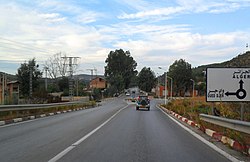val’ Djer واد جر | |
|---|---|
Commune and town | |
 | |
 | |
| Coordinates: 36°25′35″N2°33′40″E / 36.42639°N 2.56111°E | |
| Country | |
| Province | Blida Province |
| Population (1998) | |
• Total | 5,373 |
| Time zone | UTC+1 (CET) |
Oued Djer is a Village and commune in Blida Province, Algeria. According to the 1998 census it has a population of 5373 . [1]

